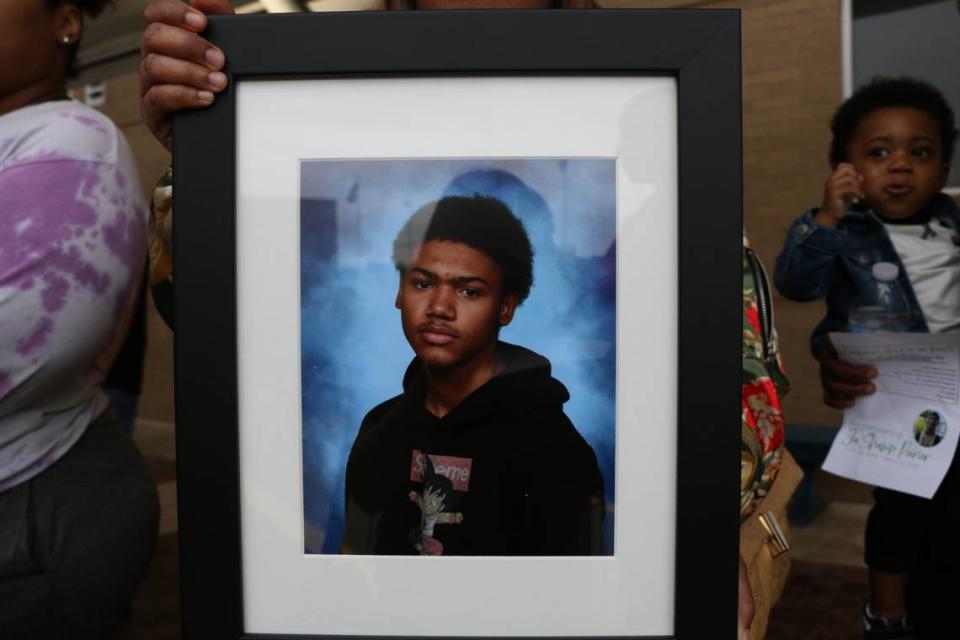Jury pool asked if they’d consider maximum 40 years for convicted Lamar High shooter
Potential jurors for the trial to sentence a 15-year-old boy found guilty of capital murder in the death of a fellow Lamar High School student in Arlington were asked Monday about their past experience on juries, their biases and if they could, under any circumstances, seriously consider the maximum sentence of 40 years.
Opening statements are scheduled to be presented Tuesday morning in Tarrant County Juvenile Court once jury selection is complete. The teen also was convicted of three counts of attempted capital murder.
The 15-year-old pleaded “true” to capital murder and three counts of attempted capital murder, Tarrant County Juvenile Court Judge Alex Kim told the potential jurors. He has been adjudicated guilty. The jury will be asked to determine a disposition ranging from no time to 40 years.
The Fort Worth Star-Telegram generally does not publish the names of juveniles who are accused of crimes, unless they are charged as adults.
The charges stemmed from a March 20 shooting in which investigators said the 15-year-old suspect brought a shotgun to Lamar High School and fired into a crowd of students on the steps outside, killing 16-year-old Ja’Shawn Poirier and wounding another student.

Assistant Criminal District Attorney Lloyd Whelchel took a special interest in whether jurors could ever consider a sentence of 40 years, the maximum sentence under Texas law for a minor who is not tried as an adult.
Most potential jurors asked the question said they would have to understand the circumstances first, but couldn’t count out the maximum sentence. Others said they couldn’t justify a 40-year sentence because of the age of the teen.
Whelchel also asked those in the jury pool about their past experience serving on a jury and any biases they might have including those stemming from professions or personal experiences that would prevent them from being fair and impartial until both sides have made their cases.
At least one potential juror told Whelchel they could not be fair or impartial because of past experiences, either their own or the experiences of their family or friends, with school shootings or lockdowns at schools.
Defense attorney Lisa Herrick asked the jurors why they think minors commit crimes, getting answers including their upbringing to having too much time on their hands.
She also asked members of the jury pool if and why they think the law should be different for minors than it is for adults, noting that a juvenile charged with capital murder cannot face more than 40 years in prison and cannot be sentenced to death. She also asked if they think their age should matter when it comes to the law.
Most in the jury pool told Herrick they think it is fair for minors to be held to different standards than adults, some adding that minors haven’t had all the same opportunities for education or that their brains have not finished developing and they may not completely comprehend the consequences of their actions. Others said more minors should be charged as adults.
Herrick also asked the jury pool about their familiarity with the juvenile justice system in Tarrant County and put an emphasis on questions about being unbiased and fair as a juror for the trial. She also questioned the jury on whether they could consider no time in jail or probation, as the minimum sentence for a juvenile convicted of capital murder.
She questioned possible jurors on their views about rehabilitation of minors and what could be done to prevent children from committing crimes or repeating offenses, getting answers about more parental involvement, after-school programs and stricter gun control laws. Several of the people in the jury pool said that parental figures should be held responsible for the crimes of their children.
Prior to the voir dire process, the 97 people who showed up for jury duty filled out questionnaires that included a question about whether they’ve read or heard news about the case. Most of them said they had, leading to about an hour of individual questions about whether news coverage they had seen or heard would impact their ability to be fair.
At least nine of the jurors told the court they could not be fair and impartial based on information they’d heard about the trial outside of court.
In June, Judge Alex Kim denied a request from the prosecutors to try the accused shooter in adult criminal court.
After he was taken into custody, the accused shooter told a juvenile services employee that he fired upon the victims when he saw a person who appeared to look like a boy who raped him in October inside a bathroom at the school, Whelchel said at a hearing in June.
Whelchel told Kim the sexual assault accusation was false and concocted by the suspect in an attempt to justify what the prosecutor said is the most heinous of offenses.
Earlier in the June hearing, Whelchel asked Arlington police homicide unit Detective Krystallyne Robinson whether Poirier, who died when buckshot severed the 16-year-old’s brain stem, had sexually assaulted the suspect in his killing.
“No, sir,” the detective testified. Indeed, Robinson said, there is no indication the respondent, as the accused is known in juvenile legal matters, knew Poirier, who moved to Arlington from Michigan at the beginning of the school year.
The father of the 15-year-old was sentenced earlier this month to more than six years in federal prison for being a felon in possession of a firearm, according to the U.S. Attorney’s Office for the Northern District of Texas. The 50-year-old man, who the Star-Telegram is not naming so as not to identify the juvenile, pleaded guilty to the charge in May. Court documents say the father was charged with illegal possession of the Mossberg 500 shotgun his son used in the fatal shooting.
In a psychiatric evaluation, the teen was found competent to stand trial.

